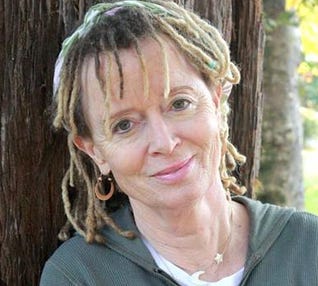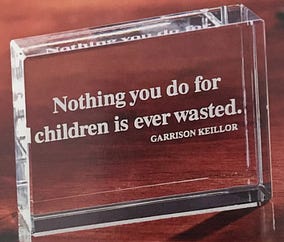|
 |
“Poem for the Family” by Susan Cataldo from Drenched: Selected Poems of Susan Cataldo. © Telephone Books, 2002.
ORIGINAL TEXT AND AUDIO - 2017
It’s the birthday of writer Anne Lamott, born in San Francisco (1954). Her parents were ardent supporters of social justice and civil rights, and they raised her to be an activist. They were also atheists, but Lamott says: “I always secretly believed that there was a God — I always secretly prayed. I always found these religious kids.” She was a good student and a talented tennis player, but she had a lot of anxiety. “I was very shy and strange-looking, loved reading above everything else, weighed about forty pounds at the time, and was so tense that I walked around with my shoulders up to my ears, like Richard Nixon [...] I was very clearly the one who was going to grow up to be a serial killer, or keep dozens and dozens of cats. Instead, I got funny. I got funny because boys, older boys I didn’t even know, would ride by on their bicycles and taunt me about my weird looks. Each time felt like a drive-by shooting.” She says that the Madeleine L’Engle book A Wrinkle in Time (1962) saved her when she was a child, because it captured the grief and isolation she felt. She also loved E.B. White, Louisa May Alcott, Rudyard Kipling, and Roald Dahl.
She dropped out of college after two years and decided to become a writer, like her father. She gave tennis lessons, and cleaned houses, and sold some magazine articles. Her father died of brain cancer in 1979, when Lamott was 25. She dedicated her first novel, Hard Laughter (1980), to him. Two more novels, Rosie (1983) and Joe Jones (1985) followed. But even though she was productive and fairly successful, she was drinking a lot. It got so bad that every morning, she would have to call her friends to find out what had happened the night before, because she couldn’t remember. One day, when she was really hung over, she heard some old spirituals coming out of a little Presbyterian church in Marin City, California, so she went inside to listen to the music. She went back the next week, and the next, but she never stayed for the sermon. Gradually, she says, she began to feel the presence of Jesus around her. “It would be like a little stray cat. You know, I would kind of nudge him with my feet and say, ‘No,’ because you can’t let him in, because once you let him in and give him milk, you have a little cat, and I didn’t want it. I lived on this tiny little houseboat at the time, and finally one day I just felt like: ‘Oh, whatever. You can come in.’”
Lamott published her first nonfiction book in 1993. That was Operating Instructions: A Journal of My Son’s First Year. She had been sober for a few years, and was in a relationship, when she found out she was pregnant. She decided to keep the baby, and when she told her partner what she had decided, he left her. She writes candidly about her first year as a single mother to her son, Sam; she also writes about her history of substance abuse, her conversion to Christianity, and her best friend’s diagnosis with a terminal illness. When Sam was 19, he became a father himself, and together he and Lamott published a sequel of sorts, called Some Assembly Required: A Journal of My Son’s First Son (2012). Lamott also wrote a popular book on writing: Bird by Bird (1994). Her newest book is Hallelujah Anyway: Rediscovering Mercy (2017).
It’s the birthday of writer who once said, “A novel captures the soul of people.” That’s Paul Theroux, born in Medford, Massachusetts (1941). Theroux is best known for novels like The Mosquito Coast (1981), about 14-year-old Charlie Fox, whose irreverent, inventor father suddenly moves the entire family from Massachusetts to the Mosquito Coast of Honduras. It was later made into a movie starring Harrison Ford as the father.
Theroux’s first novel, Waldo (1967), was published in 1967. He followed up with The Consul’s File (1972), and then found himself out of ideas for fiction. He’d always been a traveler, so he decided to get on a train in Great Britain and see what happened. Then he got on another train, and another, and found himself in Japan. That experience became his book The Great Railway Bazaar (1975), which is considered a classic in the travel writing genre.
When he travels, Theroux writes in small notebooks, and then composes first drafts in longhand on Pocket Diamond pads of paper. At 74-years-old, he spent two and half years driving more than 25,000 miles through Tennessee, Alabama, and North Carolina for his book Deep South: Four Seasons on Back Roads (2015), a portrait of poverty, culture, and hope. On the road, people called him Mr. Thorax and he delighted in breakfasting on Froot Loops in Styrofoam bowls in cheap chain motels. He said, “I like being anonymous. I’d hate having a recognizable name or face.”
He says: “The difference between travel and tourism is the difference between walking in the hot sun to meet an angry person who is going to insult me and then tell me his amazing story, and lying in the sun sipping a cool drink and reading, say, Death in Venice. The first is more profitable; the second more pleasant. Both are enlightening.”
Be well, do good work, and keep in touch.®
A great reminder for us!
CHECK OUT THE PAPERWEIGHT
You’re a free subscriber to The Writer's Almanac with Garrison Keillor. Your financial support is used to maintain these newsletters, websites, and archive. Support can be made through our garrisonkeillor.com store, by check to Prairie Home Productions P.O. Box 2090, Minneapolis, MN 55402, or by clicking the SUBSCRIBE button. This financial support is not tax deductible.


